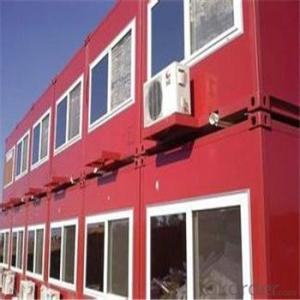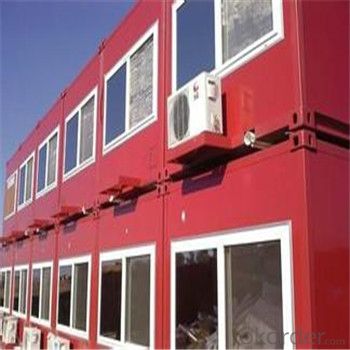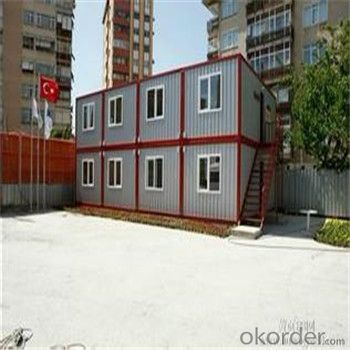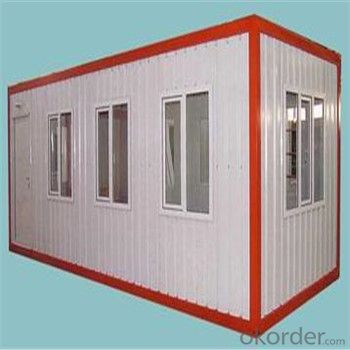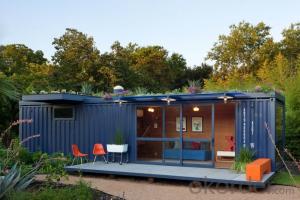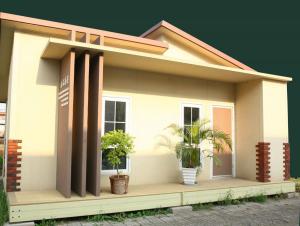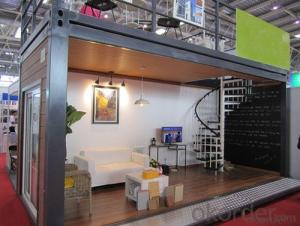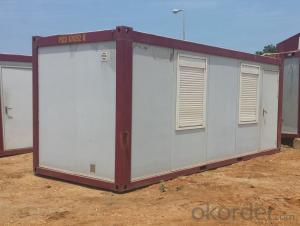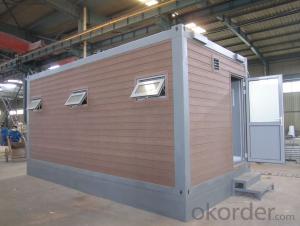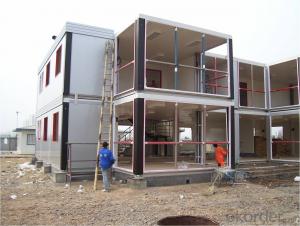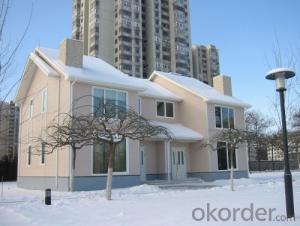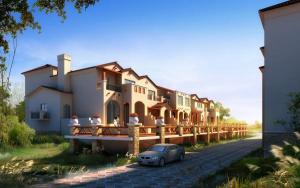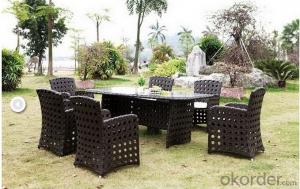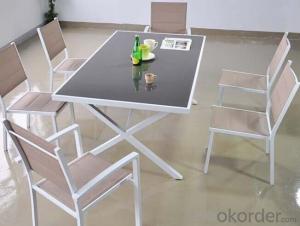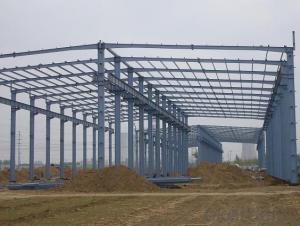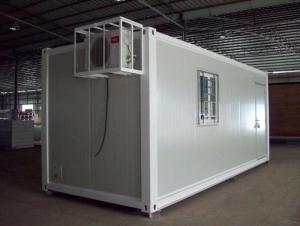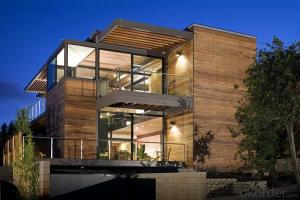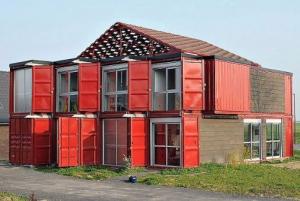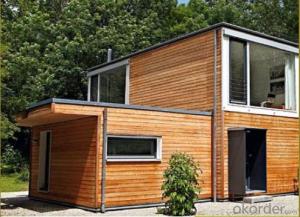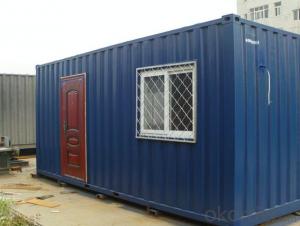Modular Steel House Outdoor Shed For Coffee Bar/Restaurant
- Loading Port:
- Shanghai
- Payment Terms:
- TT OR LC
- Min Order Qty:
- 50 m²
- Supply Capability:
- 1000 m²/month
OKorder Service Pledge
OKorder Financial Service
You Might Also Like
Outdoor Modular Steel House Shed For Coffee Bar/Restaurant
The standard container for various purposes is suitable for international container transport. It is of appropriate external dimensions and has connections for lifting and fixing or compounding. The container is designed as a light construction consisting of floor and roof frames and corner profiles. The construction enables compounding of individual containers in longitudinal and transverse directions without limits. It also enables compounding of containers in 2 floors in height (ground floor + first floor), or in 3 floors in height for warehousing of these containers (ground floor + 2 floor). The small container house is convenient and fact assembling and many
times disassembling, it can be appliced to office, dormitories, shops etc.
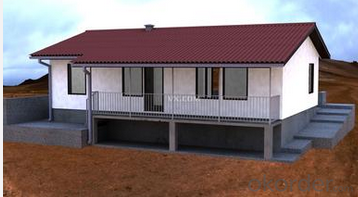
Advantage
Outdoor Modular Steel House Shed For Coffee Bar/Restaurant
container house
♥ Easy to assemble and disassemble: The houses can be assembled and disassembled for dozens of times and can be reused for many times. And the assembling only needs simple tools and doesn’t need power source. The connections of the pieces of the house all adopt plugs or screw connections.
♥ Strong Structure: It adopts steel frame structure, therefore it is stable and in line with the designing code of building structure.
♥ Heat-insulation: The roof and wall are made of color steel sandwich panel (EPS, XPS, PU or Rock Wool) which have good heat-insulating and fire-proof performance.
♥ Environment protection: The design of the house is reasonable and it is easy to assemble and disassemble.
♥ Diversified Specifications: Our design can be customized. The doors, windows, front and back walls can be exchanged each other. And the partition walls according to the customers’ requirements.
FAQ
We have organized several common questions for our clients,may help you sincerely:
①How about your company?
A world class manufacturer & supplier of castings forging in carbon steel and alloy steel,is one of the large-scale professional investment casting production bases in China,consisting of both casting foundry forging and machining factory. Annually more than 8000 tons Precision casting and forging parts are exported to markets in Europe,America and Japan. OEM casting and forging service available according to customer’s requirements.
②How to guarantee the quality of the products?
We have established the international advanced quality management system,every link from raw material to final product we have strict quality test;We resolutely put an end to unqualified products flowing into the market. At the same time, we will provide necessary follow-up service assurance.
③How long can we receive the product after purchase?
In the purchase of product within three working days, We will arrange the factory delivery as soon as possible. The pecific time of receiving is related to the state and position of customers.Commonly 7 to 10 working days can be served.
- Q: Can container houses be designed with a rooftop garden?
- Yes, container houses can be designed with a rooftop garden. The structure and versatility of container houses allow for the installation of a rooftop garden, which can provide additional green space, promote sustainability, and enhance the overall aesthetic of the house.
- Q: Are container houses suitable for artist studios or workshops?
- Indeed, container houses prove to be extremely well-suited for artist studios or workshops. Their affordability, mobility, and sustainability have led to a surge in popularity in recent years. The versatility of container houses is one of their main advantages. They can be easily modified and customized to meet the specific requirements of an artist studio or workshop. Whether it involves adding windows to allow for natural light, insulation for climate control, or partition walls to create separate workspaces, container houses can be effortlessly transformed into comfortable and functional creative spaces. Furthermore, container houses offer the convenience of portability, allowing artists to relocate their studios or workshops as needed. This mobility is especially beneficial for artists who frequently travel or prefer to work in different settings. By simply transporting their container studio to a new location, artists can save time and money that would otherwise be spent on renting or constructing a new space. In addition, container houses present an environmentally friendly choice for artists. Many containers are repurposed from shipping yards, providing them with a second lease on life instead of being discarded. By utilizing recycled materials, artists can contribute to sustainable practices and reduce their impact on the environment. Lastly, container houses often come at a more affordable price compared to traditional studios or workshops. This is particularly advantageous for artists who are just starting out or have limited financial resources. Opting for a container house can free up funds that would have been otherwise spent on purchasing, modifying, and maintaining a conventional space, allowing artists to invest in art supplies, equipment, or other artistic endeavors. To summarize, container houses offer a multitude of advantages that make them an excellent choice for artist studios or workshops. Their versatility, mobility, sustainability, and affordability make them an attractive option for artists in search of flexible and creative workspaces.
- Q: Can container houses be designed with a skylight or sunroof?
- Certainly, skylights or sunroofs can be incorporated into the design of container houses. In fact, there are several advantages to including them. To begin with, the introduction of natural light into the house through a skylight or sunroof creates a brighter and more welcoming living area. Studies have shown that natural light can enhance mood and well-being, while also reducing the need for artificial lighting during daylight hours, resulting in energy conservation. Additionally, a skylight or sunroof can greatly improve ventilation. Opening them allows fresh air to flow into the house, thereby enhancing indoor air quality and reducing the dependence on air conditioning or fans. This is especially advantageous in hot climates or during summer months. Moreover, a skylight or sunroof provides breathtaking views of the sky, stars, and surroundings, thus elevating the overall visual appeal of the container house. It creates a unique and serene atmosphere, fostering a stronger connection to nature for residents. However, when designing a container house with a skylight or sunroof, it is crucial to consider a few factors. The structural integrity of the container must be evaluated to ensure it can withstand the added weight and necessary modifications for installation. Additionally, appropriate insulation and waterproofing measures should be implemented to prevent leaks or heat loss. In conclusion, container houses can indeed be designed with skylights or sunroofs, and doing so can bring in natural light, improve ventilation, and enhance the overall ambiance of the living space.
- Q: How is the container made?
- container room, also known as container housing, container activity room, container housing
- Q: Are container houses suitable for single-story living?
- Yes, container houses are suitable for single-story living. Container houses have become increasingly popular as a housing solution due to their affordability, sustainability, and versatility. These houses are made from repurposed shipping containers, which are structurally strong and can easily be modified to create spacious and comfortable living spaces. For single-story living, container houses offer several advantages. Firstly, the open floor plan of container houses allows for flexible layouts, making it easy to design a single-story home with a layout that suits the individual's preferences and needs. The lack of load-bearing walls in container houses also allows for an efficient use of space, maximizing the living area on a single level. Additionally, container houses can be easily customized and expanded to accommodate specific requirements. Whether it's adding extra rooms, a home office, or a larger living area, container houses can be modified to meet individual preferences and lifestyle choices. Furthermore, container houses are energy-efficient and environmentally friendly. The repurposing of shipping containers reduces waste and helps in reducing the carbon footprint associated with traditional construction methods. Container houses can also be equipped with solar panels, rainwater harvesting systems, and other sustainable features to further enhance their eco-friendliness. In conclusion, container houses are highly suitable for single-story living. They offer flexibility in design, efficient use of space, easy customization, and sustainability. Whether it's for a small family, a single individual, or retirees looking for a comfortable and affordable housing solution, container houses provide a practical and appealing option for single-story living.
- Q: Are container houses suitable for daycare or childcare centers?
- Daycare or childcare centers can indeed utilize container houses as suitable options. These houses are renowned for their versatility and adaptability, making them feasible for various purposes, including childcare facilities. It is possible to easily customize and convert container houses into functional, secure, and inviting spaces for children. By incorporating proper insulation, ventilation, and soundproofing, container houses can provide a comfortable and safe environment for children to learn and play. Moreover, container houses can be designed to encompass all essential amenities required for daycare or childcare centers, such as playrooms, classrooms, restrooms, kitchens, and outdoor play areas. These houses can also be conveniently expanded or modified to cater to the evolving needs of the center as it grows. In terms of cost-effectiveness, container houses prove to be more economical compared to traditional buildings, making them an appealing choice for daycare or childcare centers with budget constraints. They are also environmentally friendly since they are constructed using recycled shipping containers, thus promoting sustainability and reducing the impact on the environment. However, it is crucial to ensure compliance with all necessary regulations and safety standards when utilizing container houses for childcare centers. These standards may consist of fire safety measures, adequate space per child, and accessibility for children with disabilities. Collaborating closely with architects and contractors experienced in designing container houses specifically for childcare facilities can guarantee adherence to all relevant regulations. To summarize, container houses present a suitable and pragmatic option for daycare or childcare centers. They offer flexibility, cost-effectiveness, and the ability to create a secure and nurturing environment for children. With meticulous planning and adherence to regulations, container houses can serve as an excellent solution for daycare and childcare facilities.
- Q: How long do container houses last?
- Container houses are structures designed to be durable and long-lasting. By properly maintaining and caring for a container house, it can endure for several decades. The lifespan of a container house depends on various factors, including the quality of the container, the environment it is situated in, and the level of maintenance it receives. The quality of the container itself is vital in determining how long it will last. Containers made of corten steel, known for its resistance to corrosion and ability to withstand harsh weather conditions, are of high-quality. These containers can endure for up to 25 years or even longer. Conversely, lower quality containers deteriorate more quickly and require more frequent repairs and maintenance. The environment in which a container house is placed also impacts its lifespan. Container houses located in coastal areas or regions with high humidity levels are more susceptible to corrosion due to saltwater or moisture in the air. Regular inspections and preventive measures such as applying anti-corrosive coatings can significantly prolong the lifespan of a container house in such environments. Proper maintenance is crucial in ensuring the longevity of container houses. Regularly inspecting the structure, checking for signs of rust or structural damage, allows for the identification and resolution of potential issues before they become significant problems. Additionally, keeping the container house clean and free from debris prevents moisture buildup and further protects the structure. In conclusion, container houses can last for many years if constructed with high-quality containers, placed in suitable environments, and receive proper maintenance. With the appropriate care, these innovative and sustainable housing solutions offer comfortable and durable living spaces for an extended period.
- Q: Can container houses be designed to have a low-maintenance exterior?
- Yes, container houses can be designed to have a low-maintenance exterior. Various materials such as metal, concrete, or fiber cement siding can be used to clad the exterior of container houses, which require minimal upkeep. Additionally, incorporating features like durable and weather-resistant finishes, easy-to-clean surfaces, and low-maintenance landscaping can further reduce the maintenance needs of container houses.
- Q: What are the disadvantages of the container house?
- 1, the main reason is the high price of land, you buy a house box, then you have to consider you put the container to rent the land
- Q: What is the advantage of a container room?
- here are two kinds of housing box, one is the side of the foam board sandwich board , Is not strong, the service life is relatively short, and not anti-theft
Send your message to us
Modular Steel House Outdoor Shed For Coffee Bar/Restaurant
- Loading Port:
- Shanghai
- Payment Terms:
- TT OR LC
- Min Order Qty:
- 50 m²
- Supply Capability:
- 1000 m²/month
OKorder Service Pledge
OKorder Financial Service
Similar products
Hot products
Hot Searches
Related keywords
